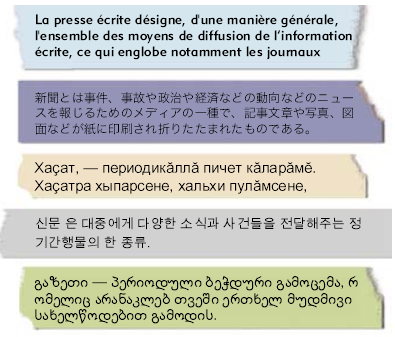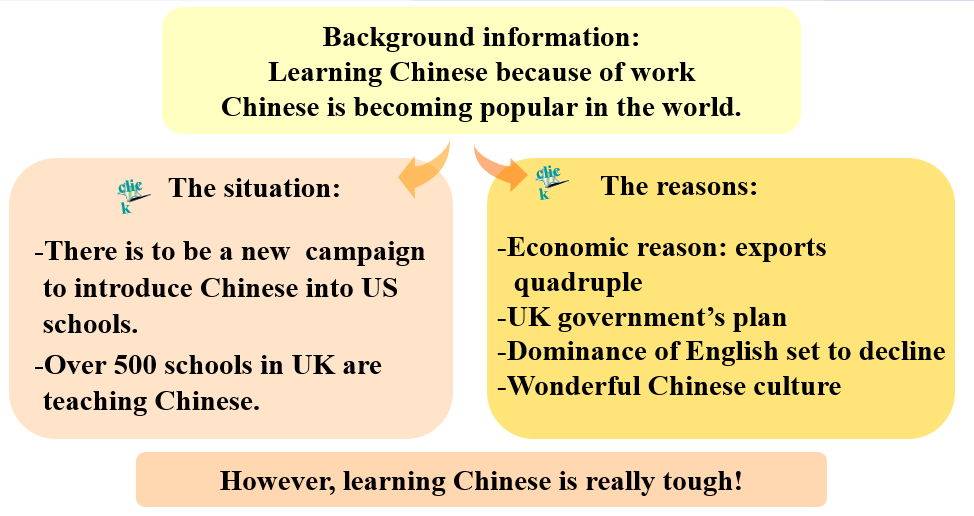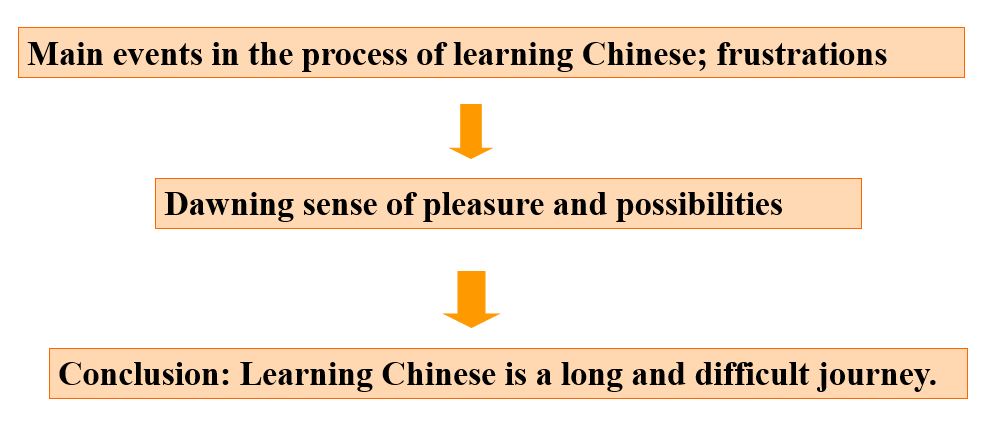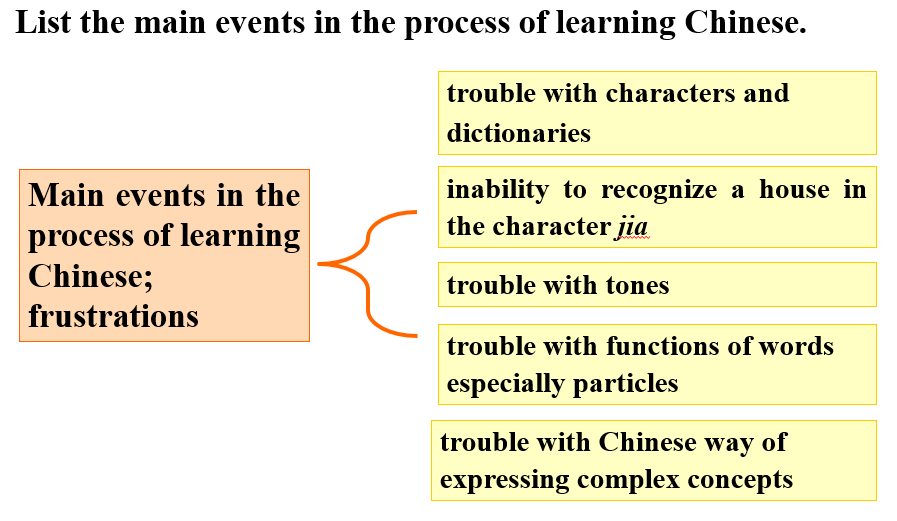Unit 9 Lessons to be learnt
 知识点一:Text Analysis: Lessons to be learnt
知识点一:Text Analysis: Lessons to be learnt
I. Warming up
Do you know what the following languages are?

1. French 2. Japanese 3. Russian 4. Korean 5. Georgian (外高加索语)
Work in pairs. Look at the examples of the languages and discuss the questions.
1. Which language is closest to Chinese? Which seems the most different?
Japanese is closest to Chinese because it uses many Chinese characters.
2. What can you tell from looking at the languages? Can you make out individual sounds or letters?
If you do not know the system it is very difficult to say anything. Some writing systems are based on words, some on syllables and some on sounds, and many are a mixture.
3. Which do you think would be the most difficult to learn? The easiest? The most interesting?
I am familiar with the Roman alphabet and Chinese characters, so the French and Japanese look easier, but I think that is just a first impression.
II. Background
Style:
Focusing on informal writing
The passage includes many features which are typical of an informal style, such as:
• a first-person narrative view
• exaggeration
• jokes and humor
• personal anecdotes and stories
• informal language or slang
• use of questions and exclamations
III. Text analysis
Text Organization:



Discussion:
Work in pairs. Look at the sentences from the passage and discuss whether they are formal or informal. If they are informal, identify which features they display.
1. You’ve heard of the Long March? Well, that is a stroll in the park, compared to what it’s like to learn Chinese.
Informal, with the use of a question, exaggeration (the Long March was extremely arduous), and the idiomatic expression a stroll in the park (something easy and undemanding), humorously contrasting with the Long March.
2. So, if 1.3 billion Chinese don’t have a problem with their own language, why do dumb foreigners like me find it so hard to learn?
Informal, with a few features of informal style, e.g. the use of a question, a first-person narrative view (like me), colloquial word dumb, and exaggeration (some foreigners do learn Chinese easily and not all Chinese find reading and writing easy).
3. UK exports to China are expected to quadruple by the end of the decade, and its government wants every school, college and university to be twinned with an equivalent institution in China.
Formal.
Paraphrase:
1. … and its government wants every school, college and university to be twinned with an equivalent institution in China.
The expression to be twinned with an equivalent institution in China means to sign an agreement with a “sister” organization in China for joint activities.
2. Its philosophy, art, food and literature show both subtlety and humanity in equal measure.
The expression in equal measure is used when the amount of one thing is the same as the amount of another thing.
The sentence means Chinese philosophy, art, food and literature are characterized as both subtle and humane.
3. … and my disgraceful strike rate is scarcely 20 characters an hour.
The expression strike rate is one of the statistics used in the sport cricket. Here it is used metaphorically to mean success rate.
4. For me, it’s a fairly basic distinction, but maybe I’m being Ms Picky.
Ms Picky here refers to a difficult fussy person. The author ironically indicates that she can’t understand why Chinese grammars are far different from those of European languages.
5. … others such as guo, ba or le are called particles, whatever that means, but don’t have an identifiable function in the terms we use to describe language.
In whatever that means, the word that means whatever the particles mean. The sentence indicates that it is very difficult to find appropriate terms with which we describe our own language to explain the use of those particles.
6. I have to keep going, as the journey will fascinate me as much as the arrival at my destination.
The journey refers to the process of learning Chinese and the arrival means the skillful grasp of Chinese.
The sentence means I will continue learning Chinese in spite of the trouble and difficulties, because the process of learning it is as attractive as finally grasping the language skillfully one day.
Summary:
The writer mainly shares her experience of learning Chinese with the readers. According to her, learning Chinese is really__________. Learning thousands of ____________________ is a ____________, and the only way is to learn them by heart. Using _____________ is another trouble. What is worse, an ______________ teacher can make learning Chinese more difficult. The writer was once totally____________ by the teacher’s explanation about the Chinese character jia. In addition, the varied __________, particles without _____________________ and Chinese way of expressing_____________________ confuse the writer. She can hardly understand why the combination of Chinese characters should be interpreted through the sum of their ____________________ meanings. Despite all those difficulties, the writer also finds learning Chinese is enjoyable, _____________ and______________. It is a profoundly_____________ and ___________challenge to her.
Keys: tough; Chinese characters; chore; dictionaries; unqualified; confused; tones; identifiable functions; complex concepts; connotational; absorbing; captivating; inspiring; thought-provoking.
IV. Reinforcement:
Discussion
(1) What are some reasons that Chinese language is growing in popularity? China is more engaged with the outside world with more tourists going in and out. New technology and globalization make it easier for people to know about other cultures. The growth in the Chinese economy makes it an asset to be able to speak Chinese.
(2) In addition to English-speaking countries, what other countries around the world do you predict will show an increased interest in learning Chinese in the future? Why? People from our main trading partners will have a good reason to learn Chinese. So I predict Chinese will be taught in France and Germany, also nearer to home, for example, Thailand and the Republic of Korea.
(3) If English speakers learn the “lessons” of this passage, what should they do with that knowledge? English learners should prepare for a long and difficult journey if they want to learn Chinese and get a good teacher, but be assured the eventual rewards will be great.
(4) Do you think there should be a “world language” that people learn in addition to their native language? If so, what should that language be? • Maybe IT will make reliable, instant translation possible in which case there will be no need for a world language. • I think there should be a world language, one spoken by a very large number of people in many different places, especially those of major intellectual and economic importance.
